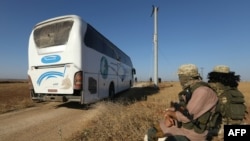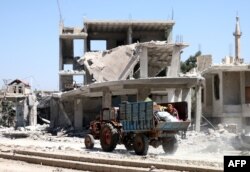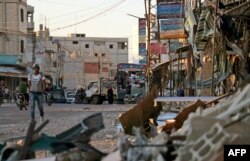The Syrian government is evacuating around 7,000 mostly Shi'ite residents of two pro-government towns north of the rebel-held city of Idlib, as part of a deal brokered by Russia and Turkey, Arab media reports. The government has agreed to release around 1,500 prisoners it holds in the exchange.
Syrian state TV showed a convoy of buses, escorted by motorcycle policemen and a number of ambulances, preparing to enter the besieged Alawite villages of Foua and Kefraya. A similar operation to evacuate remaining residents of the two villages last year was cut short after rebels bombed a busload of evacuees, killing dozens.
The television report indicated that residents of the two towns are being taken to the Aleppo suburb of Jibreen, where they will be resettled. Residents of a third town, Ishtabrak, are being evacuated to the coastal region of Latakia. At the same time, rebel fighters are being evacuated from the southern region of Daraa to the rebel-held city of Idlib.
Government forces raised the Syrian flag over the large Daraa suburb of Busra al-Sham, after rebel fighters agreed to be evacuated to Idlib. The city lies on the main north-south highway from Amman to Damascus.
Daraa Governor Mohammed Khaled al-Hanous congratulated government forces and the residents of Busra al-Sham, and said he was proud of what he called a "great victory."
Amateur video showed Nawa, a small rebel-held town west of Daraa whose militia fighters refused to surrender to government forces, being bombed overnight. Opposition media reported that there were numerous casualties due to the shelling.
Nadim Shehadi of the Fares Center at Tufts University's Fletcher School of Law and Diplomacy told VOA that most of the recent agreements to evacuate rebel forces from different parts of Syria have been worked out by international power-brokers, rather than the actual players on the ground in the Syria conflict.
"We're coming to a time where to solve problems in Syria, you need to go to Istanbul, Moscow and Tehran," Shehadi said. "It's like the old days of the empires. You have to go to the capitals of the empires, rather than [deal] with the players on the ground."
Shehadi argued that the U.S. has become somewhat of a "lesser player" in Syria developments. Arab media, however, noted that the U.S., Russia and Israel had agreed to the deal for Syrian government forces to deploy along the 1974 demarcation line with the Golan Heights, negotiated by former U.S. Secretary of State Henry Kissinger.






